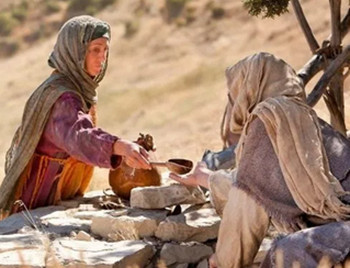The struggle to live as Christians can feel at times like a journey through a barren desert. In daily life there is often little around us that refreshes or supports our faith. Where shall we find the faith-renewing water we need? To whom shall we go? Questions of faith don’t get any more basic than that. These are the questions the disgruntled Israelites asked in the desert. These are questions that a Samaritan woman put directly to Jesus. And at times these are our questions as well. In today's readings we are provided with some answers.
 The Exodus story gets right to the point. The people are tired and thirsty, and God gives them the water they need. To their question, "Is the Lord in our midst or not?" the answer is straight forward and immediate. God becomes present in front of them and flowing water is provided. God will not let His people die in the desert.
The Exodus story gets right to the point. The people are tired and thirsty, and God gives them the water they need. To their question, "Is the Lord in our midst or not?" the answer is straight forward and immediate. God becomes present in front of them and flowing water is provided. God will not let His people die in the desert.
God’s continuing care for His people is displayed once again as we hear Jesus’ dialogue with the Samaritan woman at the well. By all standards, she had no right to even speak with The Lord. After all, she was part of the outcast group, traditional adversaries of the Jews of the time. And a woman, no less!
True to form, Jesus ignores the social customs of the day and spends time conversing with her. The disciples were aghast, and no doubt His enemies now had more fuel to add to the fire. However, Jesus eventually reveals Himself to this woman as the Messiah, the Son of God. He enters the town, and the town becomes His town. He enters a home, and it becomes His home. He enters a heart, and it becomes His heart. The guest becomes the host. He who was invited, now invites.
This is really the heart of the matter. God continually invites. This is when we come face-to-face with our God. This is when we come face-to-face with ourselves. This is when we come face-to-face with our responsibility as disciples. What He asks may seem at the moment to be impossible, unreasonable, or purposeless. It might involve giving up our comfort, our traditional way of thinking or of doing things, our health and maybe even our life.
During Lent we try to reflect, to reach out and freely embrace the Cross. But we can only do this if we have first experienced the desert when life presses down on us from many sides, and we find it too much to handle. Like the Israelites in the desert we must learn to trust God. Like the Samaritan woman we must reach deep within ourselves to a glimpse at the truth that leads to living water.
Then perhaps we can embrace the Life He has promised us knowing that God is near, that God understands our pain, and that God will sustain us and carry us beyond our own Gethsemane, beyond our own Calvary, to the triumph of our Easter - never to thirst again.





